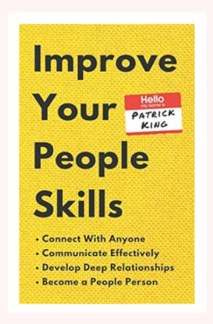Top 10 Habits that Build Confidence
 Habits that Build Confidence are a crucial aspect of our lives, and it can determine how we feel about ourselves, our abilities, and our potential.
Habits that Build Confidence are a crucial aspect of our lives, and it can determine how we feel about ourselves, our abilities, and our potential.
Building confidence takes time, effort, and consistency, but it is a rewarding journey that can lead to many opportunities and successes in life.
Confidence is a vital trait to possess in both personal and professional settings. Building confidence can take time, but it is a skill that can be learned and developed through consistent practice of positive habits.
Always remember to be kind to yourself and celebrate small successes along the way. Self-confidence is not built overnight, but with the right habits, it is achievable. Keep pushing yourself out of your comfort zone and challenging yourself to be the best version of yourself. Believe in yourself, and you can accomplish anything you set your mind to.
Confidence is a potent elixir that empowers us to face life’s challenges, pursue our dreams, and seize opportunities with unwavering self-assurance. It’s a quality that radiates from within, influencing not only how we perceive ourselves but also how others perceive us. While some may appear naturally confident, it’s essential to recognize that confidence is not solely an inherent trait; it’s a skill, a mindset, and a product of deliberate habits.
Building and sustaining confidence is a journey that begins with understanding oneself, nurturing self-belief, and consistently practicing habits that reinforce it. From the cultivation of self-awareness and the power of positive self-talk to the pursuit of continuous learning and the embrace of resilience, these habits will serve as your toolkit to enhance your self-assurance.
Table of Contents
Best Tools to Build Confidence
In this blog post, we will discuss the top 10 habits that can help you build your confidence and unleash your inner potential to succeed in your goals.
.
 Become More Likeable
Become More Likeable
How to Connect With Anyone and Communicate Effectively,
- Develop Deep Relationships, and Become a People
- How to be More Likable and Charismatic
- Become a captivating, comforting, and desired presence
- Build trust, create emotional depth, and cultivate intimacy
- People skills open the doors for your life in a way that literally nothing else can learn the right skills
.
 Personal Development
Personal Development
This book showcases and highlights the best ways to attract people and more importantly develop people skills
- How to change People
- Six ways to make people like you
- How to win people to your way of thinking
- Inspirational personal development guide
- Fundamental techniques in handling people
- Provides an authoritative program for developing the basic and essential people skills
.
 75 Success Secrets
75 Success Secrets
This book dives into the different levels of success and how to best achieve successful results. The most important aspect is to understand your vision of what success truly means to you
- Easily written to apply it into daily life routines
- 75 common but often complicated success secrets
- Summarizes lessons or secrets of success from many sources
- The secrets are practical, like master keys that anyone can use to unlock
.
 Become Bullet Proof
Become Bullet Proof
This book is a MUST READ to anyone that is looking for self development Our emotions play a vital part, as protective shield or a display of fear.
- How we fear
- Harnessing Fear
- Mental Armor
- Mental Resilience
- Be your own shift agent
- The Secret Service Mindset
.
 Daily Goals Journal
Daily Goals Journal
The book has over 100 Lists to Inspire and Motivate Your Growth and help you progress your goals
- Undated Weekly and Monthly Productivity Planner
- A5 Size Refillable To Beat Procrastination
- Easy to Organize different types of goals and milestones or brain dumb activities
.
1. Practice Self-Care
Self- care is a crucial habit that can help you build your confidence. Taking care of yourself physically, emotionally, and mentally can help you feel better about yourself and improve your self-esteem. Some ways to practice self-care include getting enough sleep, eating a healthy diet, exercising regularly, meditating, and taking time for yourself to do things you enjoy. Some examples include:
- Prioritize Rest and Sleep: Self-care involves giving yourself the necessary time to rest and recharge. Make sleep a priority by establishing a consistent sleep routine and creating a sleep-friendly environment. Aim for 7-9 hours of quality sleep each night to allow your body and mind to recover and rejuvenate.
- Engage in Mindful Practices: Practicing mindfulness can help you stay present, reduce stress, and improve overall well-being. Incorporate activities like meditation, deep breathing exercises, or yoga into your daily routine. These practices promote self-awareness, reduce anxiety, and increase feelings of calm and clarity.
- Engage in Physical Activity: Regular exercise is a vital aspect of self-care. Find activities that you enjoy and that align with your fitness level and preferences. Whether it’s going for a walk, dancing, or participating in a team sport, physical activity releases endorphins, improves mood, reduces stress, and enhances overall physical and mental well-being.
- Cultivate Hobbies and Interests: Engaging in activities that bring you joy and fulfillment is essential for self-care. Whether it’s painting, playing a musical instrument, gardening, or cooking, allocate time to pursue hobbies and interests that nourish your soul. These activities provide a sense of accomplishment, foster creativity, and offer an opportunity for self-expression and relaxation.
.
2. Practice Gratitude
Practicing gratitude or daily affirmations is a powerful habit that can help you build your confidence by focusing on the positive aspects of your life. It helps you appreciate what you have, instead of focusing on what you lack. Gratitude can help you shift your perspective and improve your mood, which can boost your confidence. Below are some examples
- Gratitude Journaling: Set aside a few minutes each day to write down three things you are grateful for. It could be something as simple as a beautiful sunrise, a supportive friend, or a delicious meal. Reflecting on the positive aspects of your life can shift your focus from what’s going wrong to what’s going right, fostering a sense of gratitude.
- Expressing Appreciation: Take the time to express gratitude to the people in your life who have made a positive impact. Write a thank-you note, send a heartfelt message, or simply say “thank you” in person. Showing appreciation not only strengthens your relationships but also cultivates a habit of gratitude.
- Mindful Reflection: Incorporate moments of reflection into your day, focusing on the things you are grateful for. During a quiet moment, pause and consciously appreciate the small blessings around you. It could be the warmth of the sun on your skin, the taste of your morning coffee, or the laughter of loved ones. Mindful reflection helps you notice and savor the present moment.
- Acts of Kindness: Engage in acts of kindness that demonstrate gratitude for others. It could be volunteering at a local charity, helping a friend with a task, or simply offering a listening ear to someone in need. Acts of kindness not only benefit others but also evoke a sense of gratitude within yourself for the ability to make a positive impact on the world.
.
3. Set Realistic Goals
Setting realistic goals is an important habit that can help you build your confidence. It is essential to set goals that are achievable and align with your values and interests. Setting unrealistic goals can lead to disappointment and can negatively impact your confidence. Below are some examples
- Specific and Measurable: Set goals that are clear and measurable. For example, instead of saying “I want to get fit,” set a specific goal like “I want to be able to run a 5K race within three months.” This way, you can track your progress and measure your success.
- Attainable and Realistic: Make sure your goals are within reach and aligned with your abilities and resources. Setting unrealistic goals can lead to disappointment and demotivation. Consider your current circumstances, available time, and resources when setting your goals.
- Time-Bound: Set a deadline or timeline for achieving your goals. This helps create a sense of urgency and motivation to work towards them. Break your goals down into smaller, manageable tasks and set deadlines for each milestone to keep yourself accountable.
- Flexibility and Adaptability: While it’s important to set specific goals, it’s also essential to be flexible and adapt as circumstances change. Life is unpredictable, and setbacks or unforeseen circumstances may occur. Be open to adjusting your goals or timelines if needed, without losing sight of the overall objective.
.
4. Embrace Failure
Failure is a natural part of life, and it is essential to learn to embrace it. Failure is an opportunity to learn, grow, and improve yourself. When you embrace failure, you can learn from your mistakes and use them as stepping stones to build your confidence and achieve your goals. Some of our favorite examples include the below:
- Learn from Mistakes: Embracing failure means seeing it as an opportunity to learn and grow. Instead of dwelling on the negative aspects of failure, analyze what went wrong and what lessons you can extract from the experience. Use failure as a stepping stone towards improvement and personal development.
- Develop Resilience: Failure can be disheartening, but it also presents an opportunity to develop resilience. Embracing failure means bouncing back from setbacks, developing a mindset that allows you to persevere, and building the strength to face future challenges with confidence and determination.
- Take Calculated Risks: Fear of failure can hold us back from taking risks and pursuing our goals. By embracing failure, you become more willing to take calculated risks and step outside your comfort zone. Failure becomes a natural part of the journey towards success, and you become more open to exploring new opportunities and possibilities.
- Shift Perspective: Instead of viewing failure as a reflection of your worth or capabilities, shift your perspective to see it as a temporary setback or a learning experience. Embracing failure means understanding that it does not define you but rather provides valuable feedback and insights to help you improve and achieve greater success in the long run.
.
5. Practice Positive Self-Talk
Positive self-talk is a habit that can help you build your confidence by changing the way you think about yourself. When you practice positive self-talk, you can reframe negative thoughts into positive ones, which can improve your mood and boost your confidence.
- Affirmations: Use positive affirmations to reframe your thoughts and reinforce positive self-talk. Create statements that reflect your strengths, capabilities, and positive qualities. Repeat these affirmations daily to counter negative self-talk and cultivate a more positive mindset.
Example: “I am capable and deserving of success. I have the skills and determination to overcome any challenges that come my way.“
- Challenge Negative Thoughts: Practice recognizing negative thoughts and replacing them with positive ones. When you catch yourself thinking negatively about yourself or your abilities, challenge those thoughts by questioning their validity and providing alternative, positive perspectives.
Example: Instead of thinking, “I always mess things up,” replace it with, “I am capable of learning from my mistakes and improving. I have overcome challenges in the past, and I can do it again.”
- Gratitude Practice: Incorporate gratitude into your self-talk by focusing on the positive aspects of your life and acknowledging your achievements. Recognize the things you appreciate about yourself and your accomplishments, big or small. This practice can help shift your mindset towards positivity and self-empowerment.
Example: “I am grateful for my resilience and determination. I am proud of the progress I have made and the growth I have experienced.”
- Encouraging Inner Dialogue: Cultivate an inner dialogue that is supportive and uplifting. Be your own cheerleader and provide yourself with words of encouragement during challenging times. Remind yourself of your strengths, remind yourself that setbacks are temporary, and motivate yourself to keep going.
Example: “I believe in myself and my abilities. I am capable of handling whatever comes my way. I will keep pushing forward and never give up.
.
6. Step Out of Your Comfort Zone
Stepping out of your comfort zone is a habit that can help you build your confidence by challenging yourself and trying new things. When you step out of your comfort zone, you can develop new skills, overcome fears, and build your self-esteem.
- Try New Experiences: Step out of your comfort zone by engaging in activities or experiences that are unfamiliar to you. It could be trying a new hobby, learning a new skill, or participating in an event or workshop that pushes you beyond your comfort zone. Embrace the opportunity to learn and grow in new areas.
- Take on Challenges: Challenge yourself by setting goals or targets that require you to stretch beyond what you’re accustomed to. It could be taking on a leadership role, public speaking, or pursuing a project that pushes your limits. By stepping up to challenges, you expand your capabilities and build confidence in your ability to overcome obstacles.
- Socialize with New People: Step out of your comfort zone by expanding your social circle. Engage in conversations and connect with individuals who have different backgrounds, interests, or perspectives. This helps broaden your horizons and exposes you to new ideas, cultures, and experiences.
- Embrace Vulnerability: Being vulnerable means allowing yourself to be open and authentic, even in situations where it feels uncomfortable. Share your thoughts, feelings, and experiences with others, and be willing to take emotional risks. Embracing vulnerability fosters deeper connections with others and allows for personal growth and self-discovery.
.
7. Surround Yourself with Positive People
Surrounding yourself with positive people is a habit that can help you build your confidence by creating a supportive environment. When you are surrounded by positive people, you can receive encouragement, support, and constructive feedback, which can help you build your confidence and achieve your goals.
- Choose Supportive Friends: Surround yourself with friends who uplift and inspire you. Seek out those who share your values, encourage your growth, and support your dreams. Positive friends can provide emotional support, offer valuable insights, and help you stay motivated on your journey.
- Join Supportive Communities: Engage with communities and groups that foster positivity and personal development. Look for organizations or online forums centered around your interests, hobbies, or professional goals. Surrounding yourself with like-minded individuals who share similar aspirations can create a positive and encouraging environment.
- Seek Mentors and Role Models: Find mentors or role models who have achieved what you aspire to accomplish. Their positive influence, guidance, and wisdom can be invaluable on your journey. Surrounding yourself with mentors who inspire you can provide valuable insights, advice, and motivation to reach your goals.
- Limit Negative Influences: Evaluate the people in your life and identify any negative influences that may be draining your energy or hindering your progress. It’s essential to set boundaries and distance yourself from toxic relationships that bring you down or discourage your growth. Surrounding yourself with positive people means creating a space that nurtures your well-being and supports your personal development.
.
8. Take Action
Taking action is a habit that can help you build your confidence by making progress towards your goals. When you take action, you can create momentum and build your confidence by seeing the results of your efforts. Below are some of our favorite examples:
- Set Goals: This is the ultimate true force behind achieving all your goals. You have to take productive and progressive action. Create a plan that works for, but your goals have to be measurable, realistic and be flexible.
- Join Supportive Communities: Engage with communities and groups that foster positivity and personal development. Look for organizations or online forums centered around your interests, hobbies, or professional goals. Surrounding yourself with like-minded individuals who share similar aspirations can create a positive and encouraging environment.
- Seek Mentors and Role Models: Find mentors or role models who have achieved what you aspire to accomplish. Their positive influence, guidance, and wisdom can be invaluable on your journey. Surrounding yourself with mentors who inspire you can provide valuable insights, advice, and motivation to reach your goals.
- Limit Negative Influences: Evaluate the people in your life and identify any negative influences that may be draining your energy or hindering your progress. It’s essential to set boundaries and distance yourself from toxic relationships that bring you down or discourage your growth. Surrounding yourself with positive people means creating a space that nurtures your well-being and supports your personal development.
.
9. Practice Mindfulness
Mindfulness is a habit that can help you build your confidence by being present in the moment and focusing on your thoughts and feelings. When you practice mindfulness, you can become more aware of your thoughts and feelings and learn to manage them effectively, which can improve your confidence and self-esteem.
- Mindful Breathing: Take a few minutes each day to focus on your breath. Sit in a quiet space, close your eyes, and pay attention to each inhale and exhale. Notice the sensations of your breath as it enters and leaves your body. This simple practice helps anchor you in the present moment and calms your mind.
- Body Scan Meditation: Set aside time to do a body scan meditation. Start from the top of your head and gradually move your attention down through your body, paying attention to any sensations or areas of tension. This practice helps you connect with your body and cultivate a sense of awareness and relaxation.
- Mindful Eating: Engage in mindful eating by slowing down and fully savoring each bite of your meal. Pay attention to the flavors, textures, and smells of the food. Take note of how it nourishes your body and brings you pleasure. By practicing mindful eating, you become more present during mealtime and develop a healthier relationship with food.
- Daily Mindfulness Moments: Incorporate mindfulness into your daily routine by setting aside dedicated moments for mindfulness. It could be a few minutes of mindful stretching in the morning, a mindful walk during your lunch break, or a few moments of reflection before bed. These intentional moments help bring you into the present and cultivate a sense of calm and clarity.
.
10. Celebrate Your Achievements
Celebrating your achievements is a habit that can help you build your confidence by acknowledging your accomplishments and progress. When you celebrate your achievements, you can boost your self-esteem, feel proud of yourself, and motivate yourself to continue to pursue your goals.
- Reflect and Acknowledge: Take time to reflect on your achievements and acknowledge the hard work, effort, and dedication you put into reaching your goals. Recognize the progress you’ve made, the obstacles you’ve overcome, and the growth you’ve experienced. Celebrate the milestones, big or small, and give yourself credit for your accomplishments.
- Reward Yourself: Treat yourself to a reward or a special indulgence as a way to celebrate your achievements. It could be something you’ve been looking forward to, like a spa day, a weekend getaway, or a nice meal at your favorite restaurant. By rewarding yourself, you reinforce the positive association with your achievements and motivate yourself to keep striving for success.
- Share with Others: Share your achievements with loved ones, friends, or a supportive community. Celebrate your accomplishments by allowing others to join in your joy and excitement. Their encouragement and praise can validate your efforts and make your achievements even more meaningful.
- Gratitude and Reflection: Practice gratitude by expressing appreciation for the opportunities, support, and resources that contributed to your success. Take a moment to reflect on the journey, the lessons learned, and the personal growth that occurred along the way. Gratitude and reflection help you maintain a positive mindset and deepen your sense of fulfillment.
.
Conclusion
Building confidence is a journey that requires time, effort, and consistency. By incorporating these top 10 habits into your life, you can unleash your inner potential and succeed in your goals. Remember to practice self-care, gratitude, and positive self-talk, set realistic goals, embrace failure, step out of your comfort zone, surround yourself with positive people, take action a nd practice mindfulness. Each habit discussed in this post can help you in different ways, and incorporating them into your daily routine can lead to positive changes in your mindset and behavior. With the right mindset and habits, you can unleash your inner potential and achieve success in your personal and professional life.
.
- 100 Valentine Lovers Questions - February 24, 2025
- 2025 New Year Growth Quotes - February 24, 2025
- 2025 Inspiring Self Love Quotes - February 24, 2025







